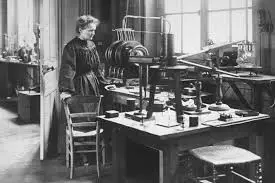Incredible story of Marie Curie, the pioneering scientist whose discoveries in radioactivity changed the world. Learn about her life, work, and legacy.
Marie Curie, a name synonymous with scientific innovation and groundbreaking discoveries, forever changed the landscape of modern science. Born on November 7, 1867, in Warsaw, Poland, she became one of the most influential figures in the fields of physics and chemistry. Her legacy is a testament to the power of determination, intellectual curiosity, and an unwavering commitment to advancing knowledge for the betterment of humanity.
Early Life and Education
Curie’s journey into the world of science began in a modest yet intellectual household. Despite the challenging political climate in Poland under Russian rule, where education for women was limited, Marie was determined to pursue her studies. After moving to Paris in 1891, she enrolled at the Sorbonne, where she faced financial difficulties but excelled academically, ultimately earning degrees in both physics and mathematics. It was in Paris where she met Pierre Curie, a fellow scientist who would become both her collaborator and husband.
Groundbreaking Discovery of Radioactivity
Marie Curie’s most notable contribution to science came with her research into radiation. In 1898, alongside her husband Pierre, she discovered two new elements: polonium, named after her homeland of Poland, and radium. The Curies’ work on radioactivity opened the door to new possibilities in science, medicine, and industry.
Radioactivity, a term coined by Marie herself, revolutionized our understanding of atomic structure and the nature of matter. Her findings would later form the basis of the development of nuclear physics, laying the groundwork for advancements in medicine, including the use of radiation in cancer treatment.
Nobel Prizes and Scientific Achievements
Marie Curie’s groundbreaking work was quickly recognized by the scientific community. In 1903, she, along with Pierre Curie and Henri Becquerel, received the Nobel Prize in Physics for their contributions to the study of radiation. This accolade marked the first time a woman had ever won the prestigious award.
In 1911, Curie was awarded a second Nobel Prize, this time in Chemistry, for her discovery of radium and polonium. This achievement made her the first and only woman to ever receive two Nobel Prizes in different scientific fields. Her relentless dedication to research, even in the face of personal tragedies and societal obstacles, solidified her place as one of the greatest minds of her time.

Challenges and Resilience
Despite her extraordinary achievements, Marie Curie’s life was not without hardship. As a woman in the male-dominated world of science, Curie faced numerous challenges. Her perseverance in the face of these difficulties served as an inspiration for future generations of female scientists. Furthermore, her personal life was marked by the tragic loss of her beloved husband, Pierre, in 1906, which left her to continue their work alone.
Her later years were marred by health complications, likely due to her prolonged exposure to radiation. However, Curie remained dedicated to her research, undeterred by the physical toll it took on her body. She continued to work relentlessly, even during World War I, when she developed mobile X-ray units to help treat soldiers injured in battle.
Legacy and Impact on Modern Science
Marie Curie’s legacy extends far beyond her own lifetime. Her pioneering work in radioactivity not only changed the scientific world but also paved the way for advancements in medicine, energy, and even space exploration. Curie’s contributions laid the foundation for the modern understanding of nuclear physics and cancer treatments involving radiation therapy.
Her unwavering dedication to science, despite personal and professional challenges, serves as a powerful example of resilience and perseverance. Marie Curie’s story continues to inspire women in science and all those who face obstacles in pursuit of their passions.
Conclusion
Marie Curie’s impact on the world of science cannot be overstated. As a trailblazer for women in scientific fields, she shattered societal norms and left an indelible mark on both physics and chemistry. From her groundbreaking discoveries in radioactivity to her pioneering work in cancer treatment, Marie Curie’s contributions have shaped the world we live in today. Her legacy lives on, inspiring future generations to push the boundaries of knowledge and explore the unknown.





